
Celebrating the impact of Lola Eniola-Adefeso at Michigan Engineering
Eniola-Adefeso, a champion for healthcare, engineering and equity, leaves the University of Michigan after 18 years.

Eniola-Adefeso, a champion for healthcare, engineering and equity, leaves the University of Michigan after 18 years.
Lola Eniola-Adefeso, the Vennema Professor of Chemical Engineering, a University Diversity and Social Transformation Professor and the Associate Dean for Graduate and Professional Education in engineering, will depart from the University of Michigan to become the new dean of the College of Engineering at the University of Illinois-Chicago (UIC).
Throughout her tenure at Michigan, Eniola-Adefeso has significantly influenced engineering education, research and efforts to create a more inclusive and equitable academic environment. Beyond the university, she has made an impact nationally by challenging the status quo in the fields of science, technology, engineering and math (STEM).
“Lola has been a huge source of inspiration for me on how to effect change passionately, thoughtfully, and skillfully,” said Chinedum Okwudire, a professor of mechanical engineering. “With Lola, creating change is simple: heart, head, and heels. It starts in her heart, goes to her head, and then right to action on her heels – literally and figuratively!”
Throughout her career, Eniola-Adefeso has launched initiatives in recruiting, education and outreach—and brought together diverse groups to tackle problems at both social and scientific intersections.
As an inaugural member of the Dean’s Advisory Committee for Female Faculty (DACFF) and co-founder of the Dean’s Advisory Committee for Faculty of Color (DACFC), she worked to address gender and racial disparities within the college. In co-founding DACFC, Eniola-Adefeso and Okwudire were tackling the problem of a lack of support network for the underrepresented minority (URM) faculty after becoming aware of an individual faculty member who was struggling under a high-stress situation.
“We had just learned about a URM faculty member who was struggling and, very concerned, Lola came to me to brainstorm how we could help,” said Okwudire. “We immediately recognized that we needed a support network, and within a matter of months, it was launched.”
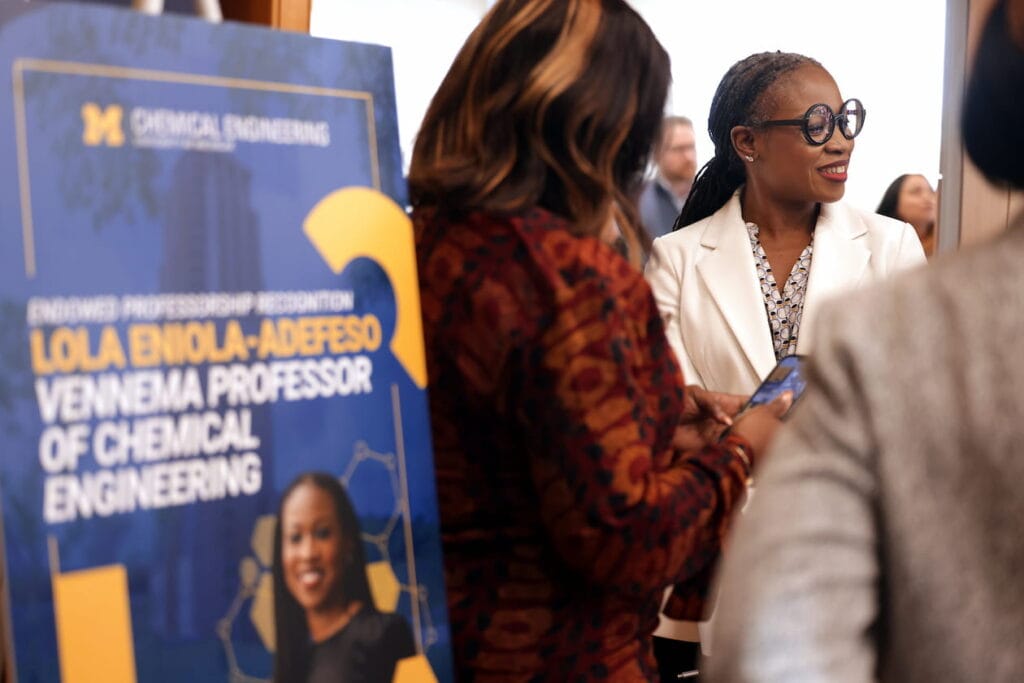
Eniola-Adefeso also spearheaded curriculum changes in the department of chemical engineering to engage U-M students in self-directed learning while incorporating outreach activities. The program has engaged over 800 K-12 students from underserved districts. Similarly, a Peer Mentoring program that integrated URM and female graduate students into the academic and social community has significantly increased retention of women and minority students – 0% of those participating students have failed the department’s qualifying exam since the program’s inception.
These programs earned her the U-M Provost’s Teaching Innovation Award.
“Lola’s efforts as our Associate Chair of Graduate Education towards intentional inclusivity have made a lasting impact,” said Sharon Glotzer, chair of the chemical engineering department, Anthony C Lembke Department Chair of Chemical Engineering. “Her initiatives have fundamentally changed how we provide mentoring support for our graduate students, especially in that often difficult first year.”
Eniola-Adefeso also led national recruitment initiatives, such as the NextProf programs, which aim to increase the number of female and URM Ph.D. students and postdocs pursuing academic careers. The NextProf Nexus workshops bring together promising senior Ph.D. candidates and postdoctoral scholars from backgrounds traditionally underrepresented in STEM to introduce them to and prepare them for a faculty position in engineering. Eniola-Adefeso played a critical role in the development of this nationally-recognized program since its inception in 2012, recently leading the expansion of the franchise to early-stage Ph.D. students with the development of NextProf Pathfinder.
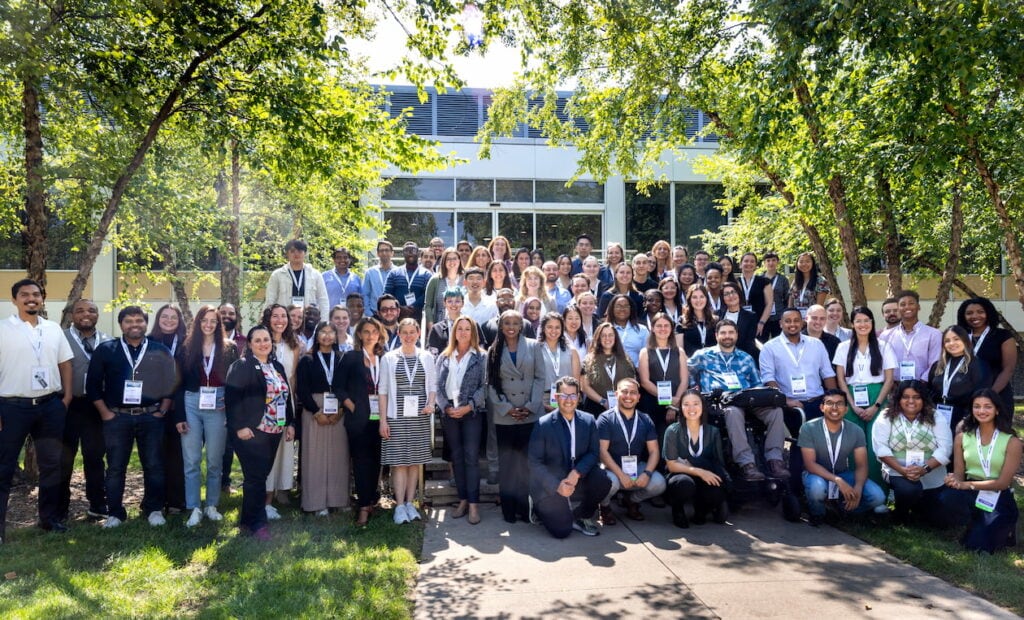
Her influence also extended to faculty hiring practices. Working with Allison Steiner, a professor of climate and space sciences, Eniola-Adefeso introduced a DEI-focused interview component for department chair candidates, influencing the appointment of several leaders dedicated to diversity.
“That year we interviewed 15 candidates for four department chair searches, leading to several positions being filled by a diverse set of faculty,” said Steiner. “This work helped to set the stage in improving the diversity of leadership in the College of Engineering – both at Michigan and other institutions as they heard about the process.”
The results of those hiring committees included appointing the first female chairs for five departments. Subsequently, two of those departments hired more faculty members from underrepresented backgrounds, including five Black or Hispanic faculty and five female faculty in just two years.
In addition to her administrative work, Eniola-Adefeso is a respected researcher with over 70 peer-reviewed publications. Her investigations into blood flow and nanoparticle-based therapeutics have garnered significant funding and recognition, including a CAREER Award from the National Science Foundation, R01 grants from the National Institutes of Health (NIH) and the American Association for the Advancement of Science (AAAS) named her a fellow.
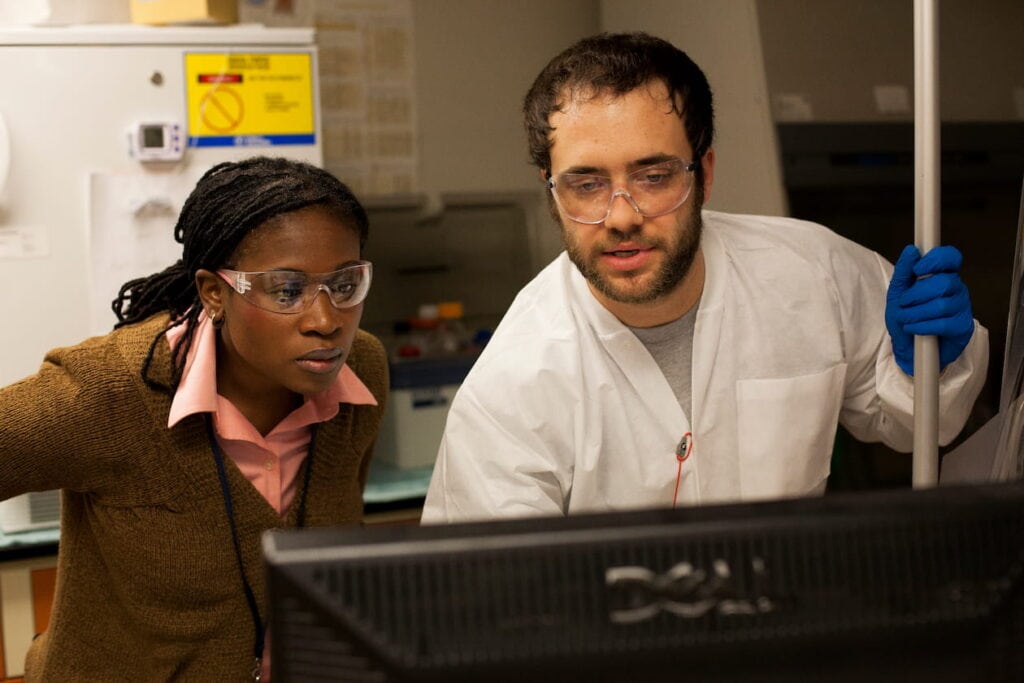
Eniola-Adefeso and her team found that a popular material used for drug delivery in mouse experiments failed when used in human blood. This study provided the first clue that harnessing the circulatory system for targeted drug delivery wouldn’t work if scientists continued to conceptualize it as analogous to municipal plumbing. Instead, her team recognized that blood functions as a tissue, which is not expected to be identical across species. Yet, she had trouble finding a journal that would publish the discovery.
“When the field is so invested in a direction, and that direction is negative, they will resist unless your paper gives them a framework of an alternative route,” she explained.
The field has gone on to embrace the importance of understanding human-specific interactions between drug-ferrying particles and components of blood, and Eniola-Adefeso’s research has gone on to highlight how these interactions can be harnessed to calm an out-of-control immune response.
Her willingness to face resistance has enabled her to advance another uncomfortable conversation: representation and funding in biomedical research.
As co-chair of the Committee for Underrepresented Minority (CURM) within the American Institute of Medical and Biological Engineering (AIMBE), she led an overhaul of the nomination process, resulting in higher numbers of female and URM fellows.
“The results of our work speak for themselves with record numbers of people from traditionally underrepresented groups being nominated and elected,” said Guillermo Ameer, a professor of biomedical engineering at Northwestern University and her co-chair. “Lola’s approach was very inclusive, seeking feedback from all stakeholders, and ensuring the criteria we proposed were transparent. It was a pleasure to work with her to get this job done and it is gratifying to see the long-lasting change we were able to bring to AIMBE.”
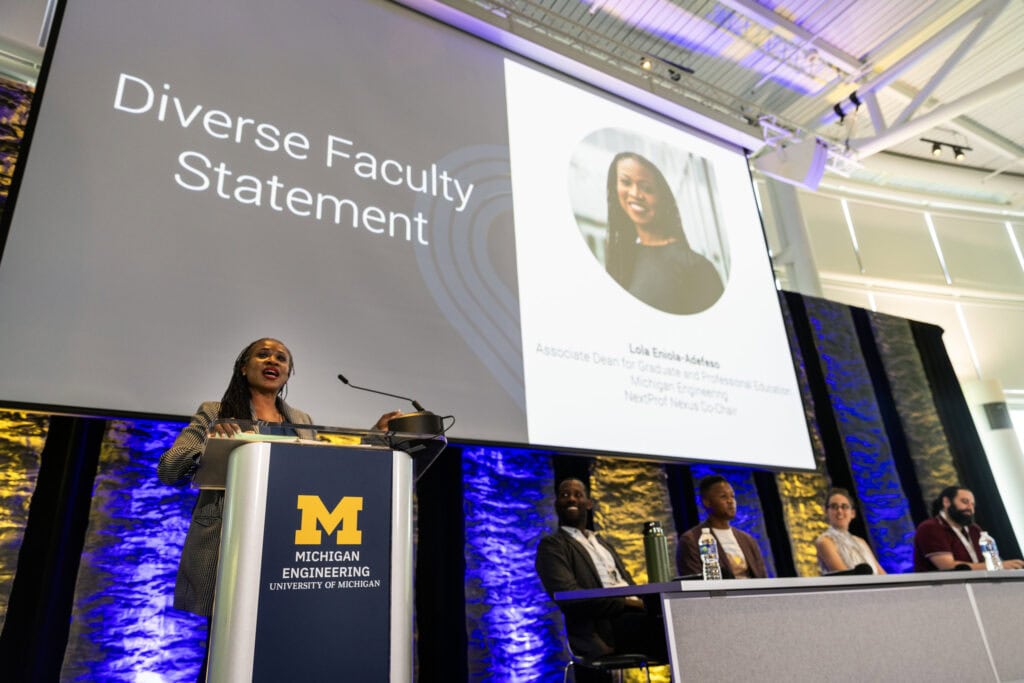
Eniola-Adefeso’s editorial, “Fund Black scientists,” published in Cell, spotlighted disparities in research funding between white and Black scientists, igniting important discussions within the scientific community. At that time, Eniola-Adefeso highlighted that white principal investigators were nearly twice as likely as Black principal investigators to be funded for a given grant application. The call-to-action attracted national attention, drawing responses from the NIH as well as the director of the U.S. Office of Science and Technology Policy.
Recently, she and a co-author of the Cell commentary were awarded $10.5 million for an NIH-funded research center, aiming to accelerate the development of clinically useful biomaterials while also fighting resource discrimination in biomedical engineering.
“She has the power to continue to do extremely impactful things, such as bring the largest producers of African American engineers together with the largest producers of American engineers,” said Joyce Shirazi, dean of the school of engineering and technology at Hampton University.
Shirazi and Eniola-Adefeso co-led the first-ever Summit for the Historically Black Colleges and Universities (HBCU) Engineering Deans Council, bringing together the HBCU deans with their counterparts at large research universities and funding agency partners. The presentations and discussions served to pool diverse perspectives, encourage innovation, and unlock the potential of an integrated engineering academy through lasting partnerships.
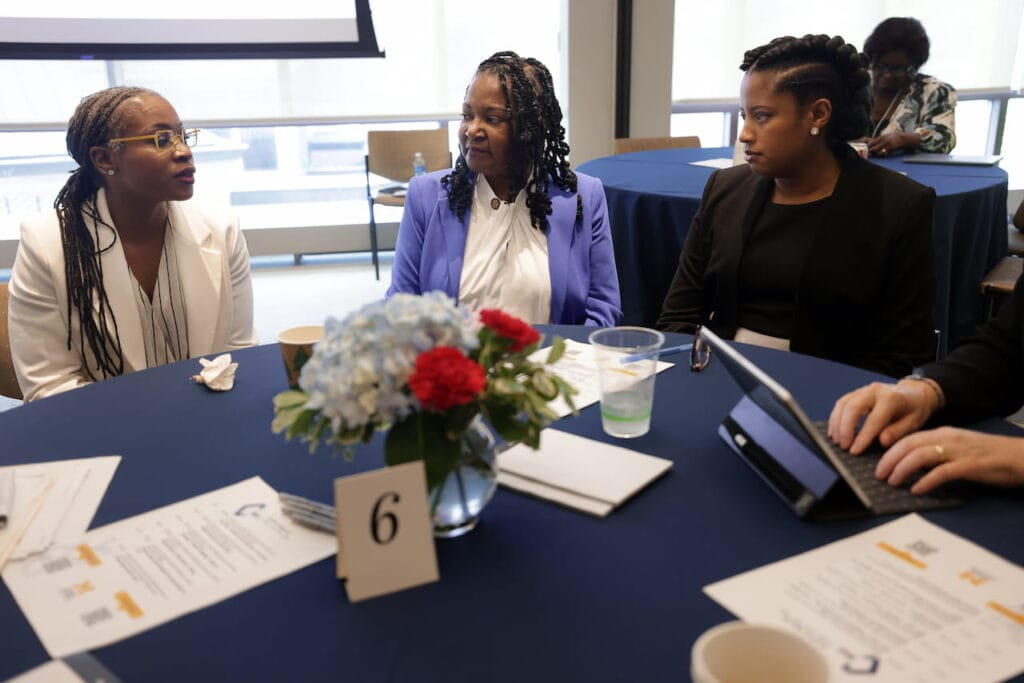
“Lola is one of the most focused and disciplined individuals I have known. Her intellect and dedication to impactful change will continue to forge a bright future for engineering,” said Shirazi. “Together, we are forging a new future for the U.S., and Lola is at the forefront,.”
Eniola-Adefeso was also a professor of macromolecular science and engineering and biomedical engineering. She also serves as the president of AIMBE and a director of the American Institute of Chemical Engineers (AIChE).
Glotzer is also the John Werner Cahn Distinguished University Professor of Engineering, the Stuart W. Churchill Collegiate Professor of Chemical Engineering, and a professor of chemical engineering, materials science and engineering, macromolecular science and engineering and physics. Steiner is also a professor of earth and environmental sciences.
The initial draft of this story was generated by U-M GPT and then revised and validated by human editors and subject matter experts.
Jennifer Judge Hensel
Executive Director, Communications & Marketing